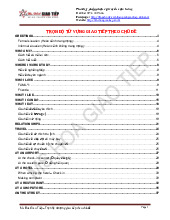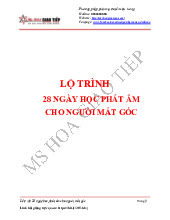


Preview text:
CHỦ ĐỀ THI NÓI MÔN AV 3 ?
1. Which stages in your life do you like best and why?
My childhood days is a best stages in my life . I never had to worry about anything
realted to adulthood then . Those were the best times of my life as opposed to my
current situation . I dunno as I get older , life is getting more unfathomable ( incâpble
of being understood ) , I have to deal with so many issues in life
2. What would you like to do when you reach at the middle aged? Why?
When I reach the middle age, I would like to travel around the world and learn about
different cultures and places.
I think this is a great way to enrich my life and broaden my horizons.
I have always been interested in exploring new things and meeting new people.
I believe that traveling can help me gain new perspectives and experiences that I can't get from staying in one place.
I also think that traveling can help me relax and enjoy the beauty of nature and art.
I would like to visit some famous landmarks, such as the Eiffel Tower, the Great Wall
of China, and the Taj Mahal. I would also like to try some local cuisines, such as sushi, pizza, and curry.
I think traveling is a worthwhile activity that can make me happy and fulfilled when I reach the middle age.
3. What kind of jobs would you like to do in the future? Why?
I chose to become a thermal engineer because I am fascinated by the principles of
heat transfer, thermodynamics, and cooling systems. I think this is a very important
and challenging field that has many applications in various industries and sectors. I
enjoy designing, building, and maintaining mechanical systems that function based on
thermal processes. I also like to perform thermal analysis and testing to monitor and
improve system performance and efficiency. I think being a thermal engineer allows
me to use my creativity and problem-solving skills to create innovative solutions for
different thermal and cooling problems. I also think that being a thermal engineer
gives me the opportunity to learn new things and keep up with the latest technologies
and developments in this field.
4. Let’s compare between jobs with high salary and jobs that you really love with
low salary, which jobs do you prefer and why?
5. Which inventions do you like best and why?
6. What modern technology would you like to have in the future? Why?
7. Which languages would you like to learn in the future and why?
There are many languages that I would like to learn in the future but
I would like to learn in the future is Japanese. I think Japanese is a very beautiful and
fascinating language, with a rich and ancient culture behind it. I would like to learn
Japanese to be able to read manga, watch anime, and visit Japan someday. I also think
that learning Japanese would challenge me and improve my cognitive skills.
8. Do you think each person should know at least 3 languages? Why or why not?
I think each person should know at least three languages, because it has many benefits
for their personal and professional development. Learning multiple languages can
improve one’s cognitive skills, such as memory, creativity, and problem-solving1. It
can also enhance one’s cultural awareness, communication, and social skills, as well
as open up more opportunities for travel, education, and career2. Moreover, learning
multiple languages can enrich one’s life by exposing them to different perspectives,
values, and traditions. Therefore, I believe that knowing at least three languages is a
valuable asset for anyone who wants to grow and succeed in this globalized world.
9. When we learn languages, should we study about the cultures of those
languages? Why or why not?
When learning languages, we should study the cultures of those languages. Because
when you do that, it will help you understand more. You won't have to create phrases
in your native language and then translate them into the new language. Understanding
culture allows foreigners to use the right word, depending on the context. This way,
there’s less room for misunderstandings and confusion. There are concepts you can
express in English, but you can't in any other language if there's a word-for-word
translation. By understanding cultural differences when learning a language, you will find new ways to express these
10. Where would you like to travel? What would you like to do when you are
travelling there? Who do you want to travel with and why?
One of the places I would like to travel to is Nha Trang. I have always been attracted
by its beautiful beaches, vibrant nightlife, and rich history.
I would like to do many things when I am travelling there, such as swimming in the
clear water, visiting the Po Nagar Cham Towers, experiencing the Vinpearl Land, and tasting the fresh seafood.
I would like to travel with my best friend, because we share the same interests and
hobbies, and we always have fun together.
Travelling with my best friend would make the trip more relaxing and enjoyable.
11. Which historical events do you like best and why?
The historical event that I like most is the liberation of the South on April 30, 1975.
because it marked the milestone when Vietnam officially gained independence, no
longer had to endure colonialism and go through a difficult and painful life. I firmly
believe that is the day that people living in Vietnam feel the happiest and most
memorable in their entire lives.
12. Why don’t young people like to watch historical documentary?
One of the reasons why young people do not like to watch historical documentaries is
that they find them boring and irrelevant. Many historical documentaries are poorly
made, with dull narration, outdated graphics, and lack of engagement. They do not
capture the attention and interest of the young audience, who are used to more
dynamic and interactive forms of media. Moreover, many young people do not see the
connection between the past and the present, and do not appreciate the value of
learning from history. They may think that historical documentaries are only for old
people, or for academic purposes, and do not relate to their own lives and experiences.
To change this situation, historical documentaries need to be more appealing and
accessible to young people. They should use more creative and innovative techniques,
such as animation, music, humor, drama, and storytelling, to make history come alive
and relevant. They should also show how history affects the present and the future,
and how young people can learn from the mistakes and successes of the past. By
doing so, historical documentaries can attract more young viewers and inspire them to appreciate and enjoy history.
13. Do you love nature ? why or why not?
14. How is the environment important to the nature? Why?
15. What should people do to help and protect our environment as well as the nature?




